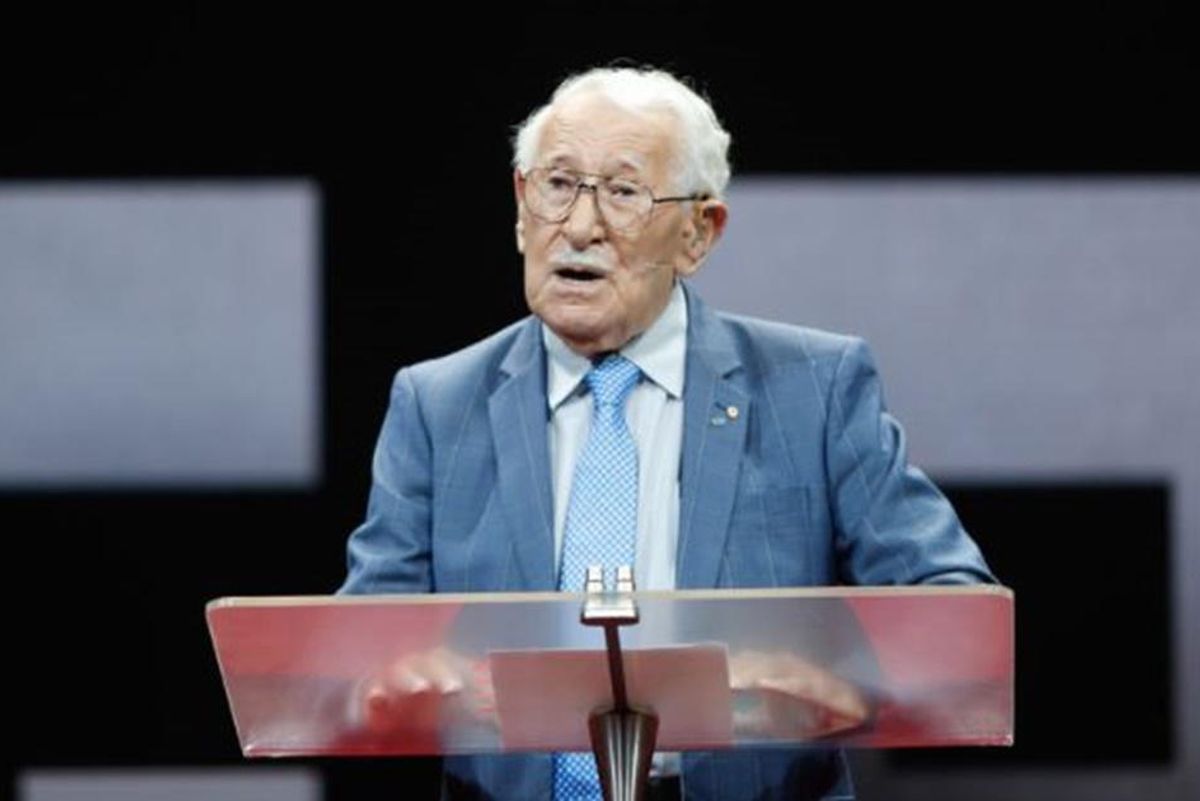101-year-old Holocaust survivor shares the secret to becoming the 'happiest man on Earth'

This story originally appeared in 2018. Eddie Jaku recently passed away and so we are re-sharing his words of wisdom. The original story begins below.
It's a shame that many of us never truly appreciate what we have until it's gone. But this flaw seems to be hardwired into the human condition. We always long for what we don't have, instead of appreciating what we do.
Eddie Jaku, 101, has given himself the title of "happiest man on Earth" because, after living through the harrowing circumstances, he was able to appreciate what really matters in life.
On November 9, 1938, a night that would be forever known as Kristallnacht, or "the night of broken glass," Nazi forces burned synagogues and destroyed Jewish stores, homes, and property. So, Jaku, a Jewish teenager, living in Germany, returned home to an empty house.
The next day he was terrorized by Nazis, who shot his dog, and took him to Buchenwald concentration camp.
Eventually, he and his family would be taken to the most notorious Nazi camp. "I was finally transported to my hell on Earth, Auschwitz," Jaku said according to Today. "My parents and my sister were also transported to Auschwitz, and I was never to see my parents again."
In 1945, he was sent on a "death march" but escaped into the wilderness, surviving on snails and slugs until he was discovered by American forces.
The 'Happiest Man On Earth,' Shares His Wisdomwww.youtube.com
After the war, Jaku got married but still had a hard time shedding his painful past. However, after having his first son, he went through a powerful transformation.
Becoming a father inspired him to make a pledge that he's kept to this day. "I made the promise that on that day, until the end of my life, I promised to be happy, smile, be polite, helpful, and kind. I also promised to never put my foot on German soil again," he said in a 2019 TED Talk. "Today, I stand in front of you, a man who has kept all of those promises."
Jaku also came to the realization that he will never truly be happy as long as there is hate in his heart. "Hate is a disease that may destroy your enemy, but will also destroy you in the process," Jaku said.
As someone who lost a lot of family in the Holocaust, he derives an incredible amount of joy from his marriage, children, and grandchildren. He wants everyone to know that happiness is all about living in the now and embracing what you have, instead of waiting for happiness to come around the corner.
The happiest man on earth: 99 year old Holocaust survivor shares his story | Eddie Jaku | TEDxSydneywww.youtube.com
"Today I teach and share happiness with everyone I meet. Happiness does not fall from the sky, it's in your hands," he said.
"Tomorrow will come, but first enjoy today," he added.
"For me, when I wake up, I am happy because it is another day to enjoy," he said. "When I remember that I should have died a miserable death, but instead I'm alive, so I aim to help people who are down."
Jaku's wisdom is especially important as we recover from the COVID-19 pandemic. Many of us who haven't lived through traumatic events now know what it's like to be disconnected from the things that really matter.
Hopefully, the positive lesson we can all take from the pandemic is to appreciate the simple things we couldn't do such as hugging a parent or spending time with friends. It's also a reason to appreciate your health.
"If you are healthy, you're a multimillionaire," Jaku said.
Jaku wants to remind people that there's nothing better than being a friend.
"Remember these words," he concluded his TED Talk. "Please do not walk in front of me, I may not be able to follow. Please do not walk behind me, I may not be able to lead. Just walk beside me and be my friend."
- Holocaust survivor is using TikTok to share her story with young people - Upworthy ›
- Holocaust survivor returns to home where he was hidden as a young boy - Upworthy ›



 Student smiling in a classroom, working on a laptop.
Student smiling in a classroom, working on a laptop. Students focused and ready to learn in the classroom.
Students focused and ready to learn in the classroom.
 Broke woman with her empty wallet.
Broke woman with her empty wallet. Man eating a plate of pancakes.
Man eating a plate of pancakes. Washing clothes by hand
Washing clothes by hand
 Fish find shelter for spawning in the nooks and crannies of wood.
Fish find shelter for spawning in the nooks and crannies of wood.  Many of these streams are now unreachable by road, which is why helicopters are used.
Many of these streams are now unreachable by road, which is why helicopters are used. Tribal leaders gathered by the Little Naches River for a ceremony and prayer.
Tribal leaders gathered by the Little Naches River for a ceremony and prayer.

 Teenagers hanging out at a park.
Teenagers hanging out at a park.